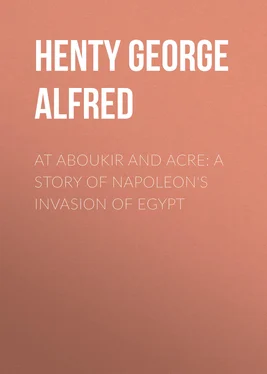George Henty - At Aboukir and Acre - A Story of Napoleon's Invasion of Egypt
Здесь есть возможность читать онлайн «George Henty - At Aboukir and Acre - A Story of Napoleon's Invasion of Egypt» — ознакомительный отрывок электронной книги совершенно бесплатно, а после прочтения отрывка купить полную версию. В некоторых случаях можно слушать аудио, скачать через торрент в формате fb2 и присутствует краткое содержание. Издательство: Иностранный паблик, Жанр: foreign_children, foreign_antique, foreign_prose, на английском языке. Описание произведения, (предисловие) а так же отзывы посетителей доступны на портале библиотеки ЛибКат.
- Название:At Aboukir and Acre: A Story of Napoleon's Invasion of Egypt
- Автор:
- Издательство:Иностранный паблик
- Жанр:
- Год:неизвестен
- ISBN:нет данных
- Рейтинг книги:5 / 5. Голосов: 1
-
Избранное:Добавить в избранное
- Отзывы:
-
Ваша оценка:
- 100
- 1
- 2
- 3
- 4
- 5
At Aboukir and Acre: A Story of Napoleon's Invasion of Egypt: краткое содержание, описание и аннотация
Предлагаем к чтению аннотацию, описание, краткое содержание или предисловие (зависит от того, что написал сам автор книги «At Aboukir and Acre: A Story of Napoleon's Invasion of Egypt»). Если вы не нашли необходимую информацию о книге — напишите в комментариях, мы постараемся отыскать её.
At Aboukir and Acre: A Story of Napoleon's Invasion of Egypt — читать онлайн ознакомительный отрывок
Ниже представлен текст книги, разбитый по страницам. Система сохранения места последней прочитанной страницы, позволяет с удобством читать онлайн бесплатно книгу «At Aboukir and Acre: A Story of Napoleon's Invasion of Egypt», без необходимости каждый раз заново искать на чём Вы остановились. Поставьте закладку, и сможете в любой момент перейти на страницу, на которой закончили чтение.
Интервал:
Закладка:
"He will not need a horse," the sheik said; "I have brought one with me for him."
Edgar had listened with delight to this conversation (which was in Arabic, which his father spoke fluently). The idea of going to stay for a time in an Arab encampment was exciting indeed, for he had already begun to find the life monotonous after the two years spent at school and in the lively companionship of his cousins.
"It were well that you should come out and see your horse," the sheik said to him, "and make friends with him while we are away, for he is not accustomed to Europeans, and might give you trouble were you to mount him at once."
Edgar and his father both went out. One of the Arabs was standing at the horse's head, rubbing its nose and talking to it as if it had been a human being.
"That is the horse," the sheik said gravely. "Only to one, whom I regard as a son, would I part with him. On his back you may scoff at pursuit by any foes, for outside my encampment there is not a horse in Egypt which it could not distance. Now it is yours to do with as you like, save to sell it, for I would not that his blood should run in any veins save those of the horses of my tribe."
"This is, indeed, a princely gift, sheik," the merchant said warmly. "'Tis a noble horse, and one that a king might ride. My son is indeed indebted to you, and will value it beyond all price."
Edgar was warm in his expressions of gratitude and admiration, although, indeed, he was unable to appreciate at its full value the points of the animal. It was a gray, and, to English eyes, would have looked light and wanting in bone, and fit rather for a lady's use than for a man's, with its slender limbs and small head; but one accustomed to Arab horses, as Mr. Blagrove was, could see at once that it was of the purest strain and highest breeding.
"Come with me," the sheik said to Edgar. "At present, you see, he is not accustomed to your white face, but he will soon come to love you, and answer to your call."
The horse, indeed, had laid back his ears, distended his dilated nostrils, and stepped back a foot or two; but as the sheik approached it gave a little whinny of pleasure, and, advancing, laid its muzzle against his cheek.
"This is your new master, Beauty," he said, as he stroked its glossy neck. "He will keep you well, and you will be as one of his children, and you must be a good friend and servant to him."
Edgar now stroked the animal. A quiver as of fear ran through it as he touched it, but as he continued, this died away; and as Edgar spoke quietly to it in Arabic, it was not long before it responded to his caresses, and after taking a good look at him with its soft liquid eyes, it put its head on his shoulder.
"You are friends now," the sheik said, with a tone of pleasure. "It is to few, even of my tribesmen, whom he would give such a greeting. He recognizes you already as his friend. Give him a handful of sweetmeats, and the bargain will be sealed."
The merchant at once sent one of the native boys out to buy a bag of sweetmeats. The sheik waited until he saw the horse taking these out of Edgar's hands and munching them contentedly, then, leaving one of his tribesmen in charge of the horse, he mounted, and rode off with his son and the rest of his followers. Edgar stood for some time talking to the horse, and then, leaving it to the native, went into the house to make his preparations for the journey.
"You have, indeed, done well for yourself, Edgar," his father said as he came in. "'Tis in every way fortunate. The Turks love us little, and though they put up with us, as they need the goods that we sell, still there may at any moment be a fanatical rising, and it is well, indeed, to have made friends with one of the desert tribes, among whom you can find a safe refuge. You little know the value of the horse he has given you. The breed is a famous one, and the sheik has been offered a fabulous sum for one of his steeds, but nothing could tempt him to part with one. An Arab prizes a valuable horse beyond all his earthly possessions, and, save under the pressure of the direst want, nothing could persuade him to part with it. In presenting it to you, therefore, the chief has shown his friendship in the most striking manner possible, and that he regards you, as he says, as one of his family."
CHAPTER II.
A BEDOUIN TRIBE
It was two hours before the sheik returned.
"We have been fortunate," he said, as Mr. Blagrove and Edgar came out into the court-yard as he entered. "The men have had their punishment. The governor, after hearing my story, sent to the head of the police, and charged him to take four men down with him into the quarter where men of this sort are generally to be found. When my son described the men to him, and said that he thought that one of them was a Maltese named Giaccamo, and the other was a Greek called Zeno, he spoke to some of his men, and they said they knew two fellows who generally went about together that answered to the description. They were, he said, notorious ruffians, but except for rioting and wounding among their compatriots, with which the police did not concern themselves, they had been able to find nothing against them, though they strongly suspected that they were concerned in many crimes. We went down with them to that quarter, and the police soon found out the place where they lived, but on enquiry were assured that both men were ill, the old woman who came to the door declaring that they had been in bed for some days. However, the police insisted upon entering, and speedily brought them down. Sidi recognized them at once, and indeed they had scarcely lied in saying that they were ill, for the eyelids of one were so swollen and blackened that he could not see out of them, while the other's nose was well-nigh as big as the rest of his face.
"They were at once taken before the cadi. He heard my son's evidence, and then said that had it been proved they attempted to steal the horse, he would have had their heads smitten off, but that though this was doubtless their intention, they had not done so. He sentenced them to a hundred blows with a stick, and to be expelled from the town and neighbourhood, warning them that should they be found near the town again, they would assuredly be punished with death. I waited and saw the blows administered, and although I felt angry that the cadi had not ordered them to execution, I admit that the punishment was severe enough, and the wretches howled like whipped curs. I trust that there will be no more trouble from them. Still, I hope that this will not prevent your son coming to visit us."
"Certainly not, sheik. He is prepared and ready to go, and he is looking forward to his stay with you with so much pleasure that even did I wish it I could not now deprive him of the enjoyment of it. Still, I am heartily glad that the two fellows have been expelled the town, for I should never have felt easy as to Edgar's safety so long as they were here."
A few minutes later the party set out. Edgar's valise was fastened to the saddle of one of the sheik's followers. The road ran along the sandy dunes that divided the low country, formerly covered by Lake Mareotis, from the sea, and as soon as they were well out from the town the horses were broke into a gallop. While in point of actual speed even the best Arab horses cannot hold their own against a moderate English race-horse, whose greater height and longer stride gives him an advantage, they are greatly superior in last, and possess extraordinary endurance and stamina. Brought up as if belonging to the family of their owners, their intelligence has been cultivated as has that of dogs. They are exceedingly docile and affectionate. Their pace is a very easy one, and Edgar was delighted indeed at the manner in which his new acquisition flew along without any apparent exertion, continuing the pace without a check until they reached the Arab encampment in an hour and twenty minutes from leaving Alexandria.
Читать дальшеИнтервал:
Закладка:
Похожие книги на «At Aboukir and Acre: A Story of Napoleon's Invasion of Egypt»
Представляем Вашему вниманию похожие книги на «At Aboukir and Acre: A Story of Napoleon's Invasion of Egypt» списком для выбора. Мы отобрали схожую по названию и смыслу литературу в надежде предоставить читателям больше вариантов отыскать новые, интересные, ещё непрочитанные произведения.
Обсуждение, отзывы о книге «At Aboukir and Acre: A Story of Napoleon's Invasion of Egypt» и просто собственные мнения читателей. Оставьте ваши комментарии, напишите, что Вы думаете о произведении, его смысле или главных героях. Укажите что конкретно понравилось, а что нет, и почему Вы так считаете.












